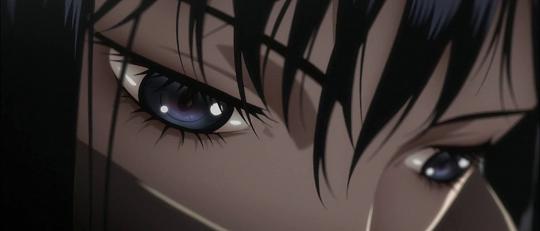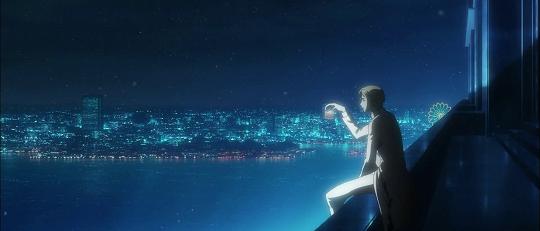Blood-C had a an inauspicious start. Schoolgirl, dark secret, monster of the week, yada-yada. The Blood franchise itself has never been overly inspiring with the original movie a notable exception but the subsequent fifty episode TV series (Blood+) and various multimedia spin-offs remained largely forgettable. It seemed that even with CLAMP's golden touch on character designs and story could not save Blood-C from malignment or misunderstandings.
The Last Dark has its work cut out for it then: try and sate the thin end of the wedge of those who grew to like the series, or try and attract an audience that might not otherwise entertain the franchise any more. For a while at least, the movie seems to satisfy both.
It starts with an homage to The Last Vampire with a chaotic skirmish on a subway train, but this is not the 1960's and it's not the lead up to the Vietnam war; this is a highly networked Tokyo and a far cry from the sleepy countryside town of Blood-C. Bystanders are still just sauntering bags of blood waiting to be popped by the shapeshifting chiropterans, and Saya - although not the peppy and saccharine character from the series - is pleasingly ruthless and pragmatic.
For the first two acts, the oppressively grim atmosphere and largely mute Saya is enough. The animation is gorgeous and slick with the wintery cityscape of Tokyo lavished with as much detail and attention as Saya's eyes, and the story seems to be building to a satisfying conclusion. You have to forgive Production I.G. for the protagonist and her new found sexually ambiguous friend Mana having a steamy bath together. You'll also have to forgive the CLAMP'isms that are sprinkled liberally throughout with the pudgy rabbit mascot popping up on computer interfaces and desks while a visit to a slender, heterochromatic shopkeeper clutters up the pacing.
All of that would be tolerable if the climax, when Nana Mizuki's spine-tingling cries of "FUMITO" are finally answered, was anything other than utter bobbins. Exposition is all but non-existent with only some oblique references to the Shrovetide of the series made; the antagonists meanwhile, one of whom is a giant, iridescent blue dreadlocked merman, are defeated either off-screen or with so little conflict they may as well have just not have bothered.
It's criminally disappointing especially when there are a thicket of great ideas and themes bubbling beneath the surface. The matriarchal overtones of the series are accelerated here with all of the women strong, smart and capable while the men are shown as enfeebled, ineffectual or simply subservient. Likewise the overbearing authoritarianism of Tower is a good, if not hamfisted, analogy for the Japanese government with the tech-savvy youth fighting against its draconian rule with the internet, mobile phones and popular culture. Symbolism is equally rife with Saya shedding some of her gruff demeanour in a scene that has walls literally breaking down.
But its all for naught if the ending leaves a sour taste in your mouth with grand sweeping questions left dangling: why did Fumito set up the experiment with Saya? why is Saya physically unable to kill humans? why was the new governor introduced alongside the antagonists but then summarily forgotten about? This was certainly not the time to hold out for a continuation, movie or series or anything in this particular branch of the franchise.
Even the series' cavalier attitude towards the lives of its secondary characters is gone just as the "Elder Bairns" (official translation) otherworldly moral outlook is. This should have been the movie to go all in with Production I.G.'s resources and talent and to show that this isn't just "Japan does vampires" and the original series wasn't just ultraviolence and censorship, coffee shops and temples. Instead it has a strong if shaky start, a wayward middle and a plummet straight to the bottom of the barrel for the ending.
There's a gut feeling of disappointment what a series you've rooted for, as the underdog and through scorn and bemusement, ignominiously fails when it should soar. Like Darker Than Black: Gemini of the Meteor before it, Blood-C: The Last Dark demonstrates there is a time and place to hope for greatness, but sometimes even though the talent and opportunity are present, there is an unspectacular failure to launch.





